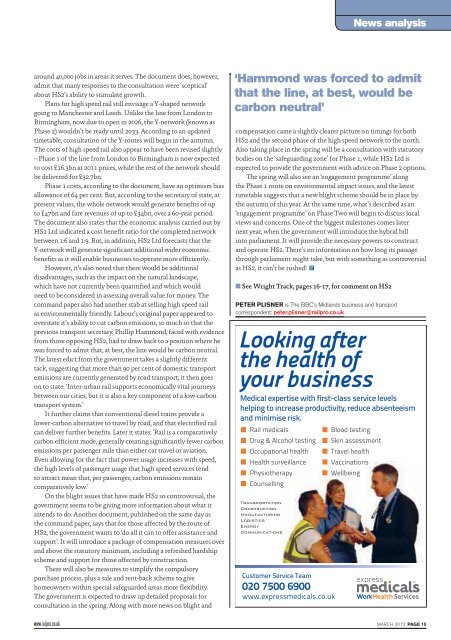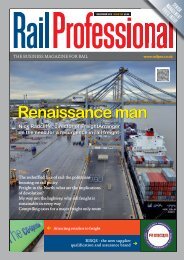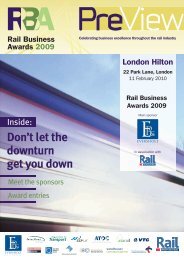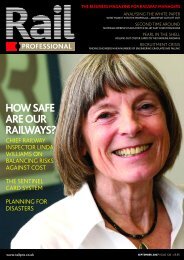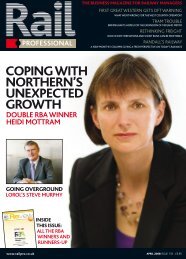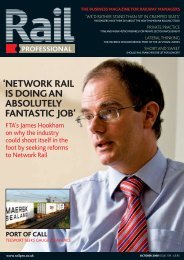View as PDF - Rail Professional
View as PDF - Rail Professional
View as PDF - Rail Professional
You also want an ePaper? Increase the reach of your titles
YUMPU automatically turns print PDFs into web optimized ePapers that Google loves.
News analysis<br />
around 40,000 jobs in are<strong>as</strong> it serves. The document does, however,<br />
admit that many responses to the consultation were ‘sceptical’<br />
about HS2’s ability to stimulate growth.<br />
Plans for high speed rail still envisage a Y-shaped network<br />
going to Manchester and Leeds. Unlike the line from London to<br />
Birmingham, now due to open in 2026, the Y-network (known <strong>as</strong><br />
Ph<strong>as</strong>e 2) wouldn’t be ready until 2033. According to an updated<br />
timetable, consultation of the Y-routes will begin in the autumn.<br />
The costs of high speed rail also appear to have been revised slightly<br />
– Ph<strong>as</strong>e 1 of the line from London to Birmingham is now expected<br />
to cost £16.3bn at 2011 prices, while the rest of the network should<br />
be delivered for £32.7bn.<br />
Ph<strong>as</strong>e 1 costs, according to the document, have an optimism bi<strong>as</strong><br />
allowance of 64 per cent. But, according to the secretary of state, at<br />
present values, the whole network would generate benefits of up<br />
to £47bn and fare revenues of up to £34bn, over a 60-year period.<br />
The document also states that the economic analysis carried out by<br />
HS2 Ltd indicated a cost benefit ratio for the completed network<br />
between 1:6 and 1:9. But, in addition, HS2 Ltd forec<strong>as</strong>ts that the<br />
Y-network will generate significant additional wider economic<br />
benefits <strong>as</strong> it will enable businesses to operate more efficiently.<br />
However, it’s also noted that there would be additional<br />
disadvantages, such <strong>as</strong> the impact on the natural landscape,<br />
which have not currently been quantified and which would<br />
need to be considered in <strong>as</strong>sessing overall value for money. The<br />
command paper also had another stab at selling high speed rail<br />
<strong>as</strong> environmentally friendly. Labour’s original paper appeared to<br />
overstate it’s ability to cut carbon emissions, so much so that the<br />
previous transport secretary, Phillip Hammond, faced with evidence<br />
from those opposing HS2, had to draw back to a position where he<br />
w<strong>as</strong> forced to admit that, at best, the line would be carbon neutral.<br />
The latest edict from the government takes a slightly different<br />
tack, suggesting that more than 90 per cent of domestic transport<br />
emissions are currently generated by road transport; it then goes<br />
on to state: ‘Inter-urban rail supports economically vital journeys<br />
between our cities, but it is also a key component of a low-carbon<br />
transport system.’<br />
It further claims that conventional diesel trains provide a<br />
lower-carbon alternative to travel by road, and that electrified rail<br />
can deliver further benefits. Later it states: ‘<strong>Rail</strong> is a comparatively<br />
carbon efficient mode, generally creating significantly fewer carbon<br />
emissions per p<strong>as</strong>senger mile than either car travel or aviation.<br />
Even allowing for the fact that power usage incre<strong>as</strong>es with speed,<br />
the high levels of p<strong>as</strong>senger usage that high speed services tend<br />
to attract mean that, per p<strong>as</strong>senger, carbon emissions remain<br />
comparatively low.’<br />
On the blight issues that have made HS2 so controversial, the<br />
government seems to be giving more information about what it<br />
intends to do. Another document, published on the same day <strong>as</strong><br />
the command paper, says that for those affected by the route of<br />
HS2, the government wants to ‘do all it can to offer <strong>as</strong>sistance and<br />
support’. It will introduce a package of compensation me<strong>as</strong>ures over<br />
and above the statutory minimum, including a refreshed hardship<br />
scheme and support for those affected by construction.<br />
There will also be me<strong>as</strong>ures to simplify the compulsory<br />
purch<strong>as</strong>e process, plus a sale and rent-back scheme to give<br />
homeowners within special safeguarded are<strong>as</strong> more flexibility.<br />
The government is expected to draw up detailed proposals for<br />
consultation in the spring. Along with more news on blight and<br />
‘Hammond w<strong>as</strong> forced to admit<br />
that the line, at best, would be<br />
carbon neutral’<br />
compensation came a slightly clearer picture on timings for both<br />
HS2 and the second ph<strong>as</strong>e of the high speed network to the north.<br />
Also taking place in the spring will be a consultation with statutory<br />
bodies on the ‘safeguarding zone’ for Ph<strong>as</strong>e 1, while HS2 Ltd is<br />
expected to provide the government with advice on Ph<strong>as</strong>e 2 options.<br />
The spring will also see an ‘engagement programme’ along<br />
the Ph<strong>as</strong>e 1 route on environmental impact issues, and the latest<br />
timetable suggests that a new blight scheme should be in place by<br />
the autumn of this year. At the same time, what’s described <strong>as</strong> an<br />
‘engagement programme’ on Ph<strong>as</strong>e Two will begin to discuss local<br />
views and concerns. One of the biggest milestones comes later<br />
next year, when the government will introduce the hybrid bill<br />
into parliament. It will provide the necessary powers to construct<br />
and operate HS2. There’s no information on how long its p<strong>as</strong>sage<br />
through parliament might take, but with something <strong>as</strong> controversial<br />
<strong>as</strong> HS2, it can’t be rushed!<br />
■ See Wright Track, pages 16-17, for comment on HS2<br />
PeTeR PLISNeR is The BBc’s Midlands business and transport<br />
correspondent: peter.plisner@railpro.co.uk<br />
Medical expertise with first-cl<strong>as</strong>s service levels<br />
helping to incre<strong>as</strong>e productivity, reduce absenteeism<br />
and minimise risk.<br />
<strong>Rail</strong> medicals<br />
Blood testing<br />
Drug & Alcohol testing Skin <strong>as</strong>sessment<br />
Occupational health Travel health<br />
Health surveillance Vaccinations<br />
Physiotherapy<br />
Wellbeing<br />
Counselling<br />
Customer Service Team<br />
020 7500 6900<br />
www.expressmedicals.co.uk<br />
MArch 2012 Page 15


